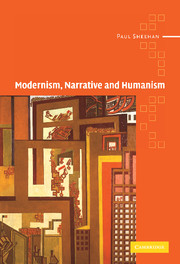Book contents
- Frontmatter
- Contents
- Preface
- Acknowledgments
- Introduction: The anthropometric turn
- 1 Narrating the animal, amputating the soul
- 2 Conrad and technology: homo ex machina
- 3 The Lawrentian transcendent: after the fall
- 4 Woolf's luminance: time out of mind
- 5 Doubting Beckett: voices descant, stories still
- Conclusion: Humanness unbound
- Notes
- Bibliography
- Index
4 - Woolf's luminance: time out of mind
Published online by Cambridge University Press: 06 July 2010
- Frontmatter
- Contents
- Preface
- Acknowledgments
- Introduction: The anthropometric turn
- 1 Narrating the animal, amputating the soul
- 2 Conrad and technology: homo ex machina
- 3 The Lawrentian transcendent: after the fall
- 4 Woolf's luminance: time out of mind
- 5 Doubting Beckett: voices descant, stories still
- Conclusion: Humanness unbound
- Notes
- Bibliography
- Index
Summary
Movement and change are the essence of our being; rigidity is death; conformity is death: let us say what comes into our heads, repeat ourselves, contradict ourselves, fling out the wildest nonsense, and follow the most fantastic fancies without caring what the world does or thinks or says. For nothing matters except life; and, of course, order.
Virginia Woolf[T]hese two discoveries – that the life of our sexual instincts cannot be wholly tamed, and that mental processes are in themselves unconscious and only reach the ego and come under its control through incomplete and untrustworthy perceptions – these two discoveries amount to a statement that the ego is not master in its own house. Together they represent the third blow to man's self-love, what I may call the psychological one.
Sigmund FreudAccording to Freud's narrative of human disillusionment, the first two body-blows to human pride were the Copernican theory of planetary motion, and the Darwinian affirmation of animal, rather than divine, descent. Taken together, heliocentrism, natural selection and the psyche's unconscious may have served to cripple, as Freud declared, homo sapiens's claim to autonomy and discontinuity with the rest of nature. But this antihumanist narrative does not follow a strict teleology, as it overlooks the many and diverse attempts to shore up waning humanist self-confidence. These efforts go by the names noted in previous chapters: anthropomorphism, transcendence (of nature), instrumental reason, and even narrative itself, in its orthodox guises.
- Type
- Chapter
- Information
- Modernism, Narrative and Humanism , pp. 121 - 149Publisher: Cambridge University PressPrint publication year: 2002



